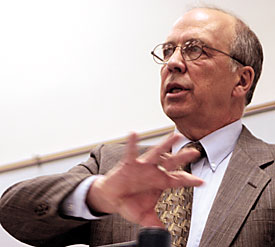 |
|
DAVID HARDEN/Arizona Daily Wildcat
|
Provost George Davis gives the Faculty Senate an update about Focused Excellence yesterday at the James E. Rogers College of Law. The Faculty Senate also discussed the new campus laws dealing with student threats.
|
|
By Jeff Sklar
Arizona Daily Wildcat
Tuesday April 8, 2003
President, provost tell Faculty Senate to expect amended Focused Excellence changes
Senior administrators expect to release revised versions this week of plans to eliminate 16 university programs, Provost George Davis told the Faculty Senate yesterday.
Davis and President Pete Likins have been reviewing responses from deans and vice presidents to proposals they released in January calling for the elimination of the programs, which range from environmental hydrology to landscape architecture.
At least some of those responses include pleas to save the programs or alternatives to eliminating them.
Davis wouldn't hint after the meeting how he and Likins would respond, but he told the senate they would publicly release their thoughts this week.
Those plans will then undergo an extensive faculty review process, unless all affected faculty agree to the changes Likins and Davis propose.
That process hasn't yet been triggered for any of the proposed changes, said Faculty Chair Jory Hancock.
"We're just not at that stage yet," Hancock said.
Likins had hoped to present more than 40 proposals for cuts, mergers and reorganizations under his Focused Excellence plan to the Arizona Board of Regents in June. Davis said yesterday that UA will present the board with some, but not all, of those plans in June.
Others will have to wait until next school year. The committees of faculty, staff and students who will review the proposals won't meet during the summer, Davis said.
Several heads of departments that face elimination or a merger have said their deans have voiced support for keeping the programs.
In the College of Architecture, Planning and Landscape Architecture, Dean Richard Eribes has proposed charging student fees that would help make the college more financially independent.
Davis told the senate that he and Likins have waded through thick notebooks filled with letters from people arguing on behalf of programs facing elimination and merger.
The senate yesterday also delayed deciding whether to support a policy that would prohibit students from threatening physical harm to anyone on campus. It would also give the Dean of Students Office authority to discipline students who make threats.
The policy, which is already in effect on an interim basis, will come before the senate at its May meeting.
Administrators worked to adopt the policy after Robert Stewart Flores Jr., a disgruntled nursing student, shot and killed three of his professors and then himself last semester. Flores had threatened his professors, but no disciplinary action had been taken against him.
Though the absence of a quorum prevented senators from voting on the policy, they briefly discussed its language.
Sen. Marlys Witte said the policy wasn't explicit enough in its definition of what constituted a threat, and said it could be used against students voicing legitimate physical dissent. Other senators disagreed, saying the policy should punish psychological dissent as well.
In his last meeting as a faculty senator, Graduate and Professional Student Council President Pete Morris presented Likins with a boomerang from Morris' native Australia.
Morris praised Likins' openness at working with graduate students, and after months of pressuring Likins to protect graduate assistants from losing money to the recently approved tuition hike, Morris said he was convinced that teaching assistants will be protected.
He said he was confident that research assistants will be kept safe too.
Morris' presidential term ends April 22.

